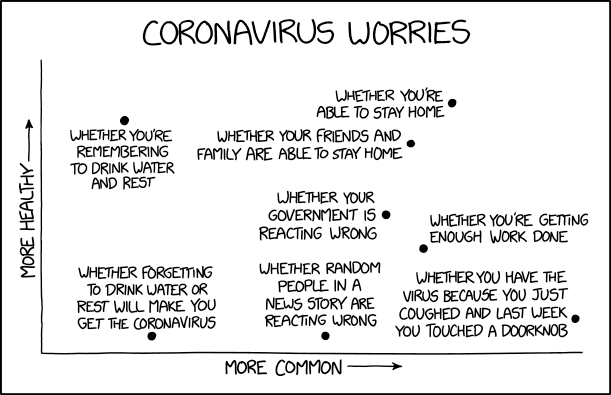Coronavirus Worries

Offscreen, bottom left: Whether the custom :coronavirus: Slack react emoji you just added was public domain or whether you should have put a Creative Commons credit somewhere

Offscreen, bottom left: Whether the custom :coronavirus: Slack react emoji you just added was public domain or whether you should have put a Creative Commons credit somewhere
This comic is the eighth comic in a row in a series of comics about the COVID-19 pandemic.
Randall has created a scatter plot graph showing "more common" worries versus the "more healthy" worries. Presumably, "more healthy" refers to more important things to worry about concerning the COVID-19 pandemic. From this graph, Randall notes that the "more healthy" concerns are not necessarily the ones that are the most common.
On the left side of the graph, signifying "less common" worries/concerns are concerns relating to the drinking of water, and resting. Drinking water (staying hydrated) and getting enough sleep each night are important ways to fight off disease, and they're things that almost everyone can take direct action on, so this is marked as one of the most healthy things to worry about. In 2281: Coronavirus Research, Megan shows signs that she (like many) has not been taking care to get enough sleep. However, not drinking enough water and not sleeping enough are not likely to cause coronavirus specifically, so that particular worry is marked as one of the least healthy.
In the middle of the graph are "medium common" worries/concerns. The "most healthy" or vital concerns are being able to stay home and the ability for friends and family to stay home. Across much of the world, public gatherings have been discouraged, including requiring many workers to telecommute. This is following the principle of social distancing, to slow the spread of COVID-19. These are considered very healthy concerns to be having.
Below these two concerns is concern about the government response, specifically if the government is "reacting wrong". Many world governments have been criticized for inadequate responses to the pandemic. However, even if the government's response (or lack of response) is incorrect, it is not something that most people can control directly, nor should it prevent people from taking care of the more healthy concerns about staying home and staying well-hydrated and well-rested, which is why this worry is marked as being only moderately healthy. Even less important than the government response is worrying about the reactions of random people featured in news stories (who are most likely featured specifically because their behavior is extreme or aberrant) or Internet trolls or people who have different opinions to you in the story's comments section.
A more common concern listed is "whether you are getting enough work done". Telecommuting (working from home) may be less productive than working at the normal office, so Randall or others may be concerned about their work productivity. For people working in industries that directly affect the health and well-being of others, such as medicine, this is a fair concern (and many of the event cancellations and other responses are intended to make their jobs easier), but in general, this is a much less healthy concern than staying home and well-rested.
The most common and least important concern according to Randall is "whether you have the virus because you just coughed and last week you touched a doorknob". Though it is an important to be concerned about catching the coronavirus, simply coughing a few times or "touching a doorknob" are unlikely reasons to suspect having COVID-19. Most cases of COVID-19 do include a cough, and the disease can be latent for over a week before showing symptoms, but also include other symptoms, including fever and difficulty breathing.
The title text lists an uncommon, unimportant concern: the copyright status of a "coronavirus emoji" on Slack (a business instant messaging software). The Creative Commons license is a license allowing for fair use of published work (and presumably emojis) that are otherwise copyrighted. Something that is in public domain has no copyright protection on it, and can be used freely. Presumably, this is a concern that only Randall has, making it uncommon. It is also relatively unimportant in the greater scheme of the COVID-19 pandemic.